
Florodora is an Edwardian musical comedy. After its long run in London, it became one of the first successful Broadway musicals of the 20th century. The book was written by Jimmy Davis under the pseudonym Owen Hall, the music was by Leslie Stuart with additional songs by Paul Rubens, and the lyrics were by Edward Boyd-Jones, George Arthurs and Rubens.

Lionel John Alexander Monckton was an English composer of musical theatre. He became Britain's most popular composer of Edwardian musical comedy in the early years of the 20th century.

The Toreador is an Edwardian musical comedy in two acts by James T. Tanner and Harry Nicholls, with lyrics by Adrian Ross and Percy Greenbank and music by Ivan Caryll and Lionel Monckton. It opened at the Gaiety Theatre in London, managed by George Edwardes, on 17 June 1901 and ran for an extremely successful 675 performances. It starred Marie Studholme, Gertie Millar, Harry Grattan, Edmund Payne, George Grossmith, Jr. and the young Sidney Bracy. Gabrielle Ray later joined the cast. The show also enjoyed Broadway runs in 1902 and 1904 and toured internationally.

The Gaiety Theatre was a West End theatre in London, located on Aldwych at the eastern end of the Strand. The theatre was first established as the Strand Musick Hall in 1864 on the former site of the Lyceum Theatre. In 1868, it became known as the Gaiety Theatre and was, at first, known for music hall and then for musical burlesque, pantomime and operetta performances. From 1868 to the 1890s, it had a major influence on the development of modern musical comedy.

The Shop Girl was an Edwardian musical comedy in two acts written by Henry J. W. Dam, with lyrics by Dam and Adrian Ross and music by Ivan Caryll, and additional numbers by Lionel Monckton and Ross. It premiered at the Gaiety Theatre in London in 1894 and ran for an extremely successful 546 performances. Its cast included Seymour Hicks, George Grossmith Jr., Arthur Williams, Edmund Payne, and Ellaline Terriss. It soon played in New York and was successfully revived in London in 1920.
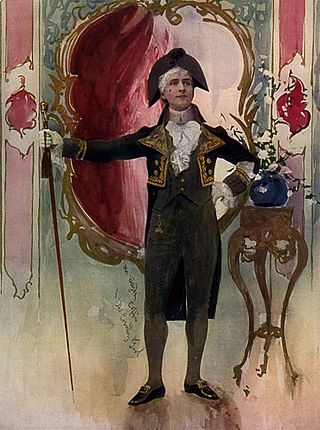
A Country Girl, or, Town and Country is a musical play in two acts by James T. Tanner, with lyrics by Adrian Ross, additional lyrics by Percy Greenbank, music by Lionel Monckton and additional songs by Paul Rubens.

The Orchid is an Edwardian musical comedy in two acts with music by Ivan Caryll and Lionel Monckton, a book by James T. Tanner, lyrics by Adrian Ross and Percy Greenbank, and additional numbers by Paul Rubens. The story concerns marital mix-ups and the quest of a wealthy man for a $2,000 Peruvian orchid to be sent to France. When foul play keeps the flower from reaching its destination, it is discovered that a nearly identical orchid is growing in the garden of the horticultural college.
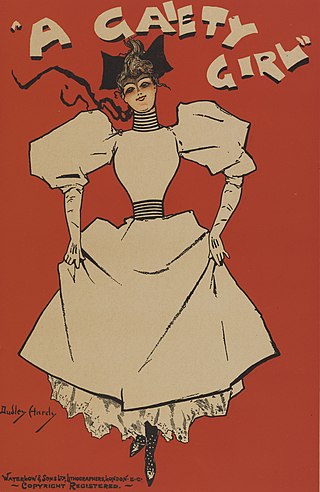
A Gaiety Girl is an English musical comedy in two acts by a team of musical comedy neophytes: Owen Hall, Harry Greenbank (lyrics) and Sidney Jones (music). It opened at Prince of Wales Theatre in London, produced by George Edwardes, on 14 October 1893 and ran for 413 performances. The show starred C. Hayden Coffin, Louie Pounds, Decima Moore, Eric Lewis, W. Louis Bradfield, and later Rutland Barrington, George Grossmith, Jr., Scott Russell, Huntley Wright and Marie Studholme. Topsy Sinden and later Letty Lind danced in the piece. Choreography was by Willie Warde. Percy Anderson designed the Japanese costumes for the musical, while the non-Japanese costumes were supplied by leading fashion houses. Blanche Massey was one of the Gaiety Girls in the piece. It also had a successful three-month Broadway run in 1894, followed by an American tour and a world tour.
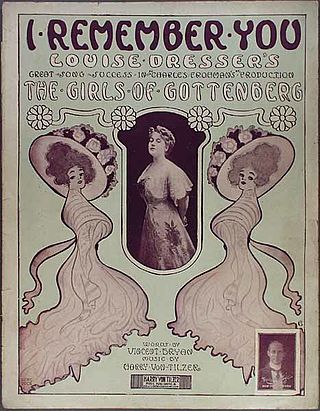
The Girls of Gottenberg is an Edwardian musical comedy in two acts by George Grossmith, Jr. and L. E. Berman, with lyrics by Adrian Ross and Basil Hood, and music by Ivan Caryll and Lionel Monckton. P. G. Wodehouse's personal papers indicate that he wrote the lyrics for one song, "Our Little Way", but this was not included in the libretto of show, and he was not credited as a lyricist. Set in Germany, the comedy of the show is largely based on stereotypes of the German people and their culture as seen through a British lens.

The School Girl is an Edwardian musical comedy, in two acts, composed by Leslie Stuart with a book by Henry Hamilton and Paul M. Potter, and lyrics by Charles H. Taylor and others. It concerns a French school girl from a convent, who goes to Paris to help her lovesick friend. Through mistaken identity, she learns secrets that help her at the Paris stock exchange and ends up at a students' ball in the Latin Quarter. All ends happily.

The White Chrysanthemum is an English musical in three acts by Arthur Anderson and Leedham Bantock, with lyrics by Anderson and music by Howard Talbot. First produced at the Tyne Theatre, Newcastle, 23 April 1904, it opened at the Criterion Theatre, produced by Frank Curzon and directed by Austen Hurgon, on 31 August 1905 and ran for 179 performances, closing on 10 February 1906. The Japanese-themed musical starred Isabel Jay, Rutland Barrington, Lawrence Grossmith, and Henry Lytton. Louie Pounds later joined the cast. The musical enjoyed various international productions including one at the Kings Theatre in Melbourne, Australia in 1917 starring Barry Lupino.

The Girl Behind the Counter is an Edwardian musical comedy with a book by Arthur Anderson and Leedham Bantock, music by Howard Talbot and lyrics by Arthur Anderson.

Filmzauber, literally 'Film Magic', is a Posse mit Gesang in four scenes by Walter Kollo and Willy Bredschneider, with a German libretto by Rudolf Bernauer and Rudolph Schanzer. A parody of silent films, Filmzauber premiered in Berlin in 1912. An English version, The Girl on the Film, translated and adapted by James T. Tanner with additional music by Albert Szirmai, premiered in London in 1913 and was later performed in New York and elsewhere.
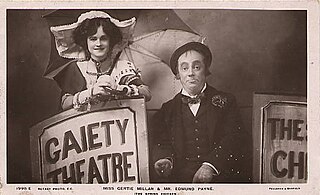
The Spring Chicken is an Edwardian musical comedy adapted by George Grossmith, Jr. from Coquin de Printemps (1897) by Jaime and Duval, with music by Ivan Caryll and Lionel Monckton and lyrics by Adrian Ross, Percy Greenbank and Grossmith. The story takes place in Paris and Château de Malmaison.

To-Night's the Night is a musical comedy composed by Paul Rubens, with lyrics by Percy Greenbank and Rubens, and a book adapted by Fred Thompson. Two songs were composed by Jerome Kern. The story is based on the farce Les Dominos roses by Alfred Hennequin and Alfred Delacour.
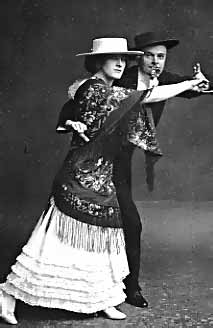
The Sunshine Girl is an Edwardian musical comedy in two acts with a book by Paul A. Rubens and Cecil Raleigh, lyrics and music by Rubens and additional lyrics by Arthur Wimperis. The story involves a working girl who falls in love with the heir to the factory. He is in disguise and wants to be loved for himself, not his position, so he gets his friend to pose as the heir, leading to complications for both men.
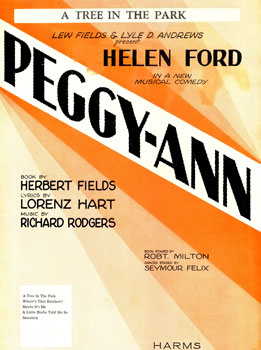
Peggy-Ann is a musical comedy with music by Richard Rodgers, lyrics by Lorenz Hart and book by Herbert Fields, based on the 1910 musical Tillie’s Nightmare by Edgar Smith. The plot of the musical takes place in Glens Falls, New York; New York City, and Havana, Cuba.

The Duchess of Dantzic is a comic opera in three acts, set in Paris, with music by Ivan Caryll and a book and lyrics by Henry Hamilton, based on the play Madame Sans-Gêne by Victorien Sardou and Émile Moreau. Additional lyrics by Adrian Ross. The story concerns Napoleon I and a laundress, Catherine Üpscher, who marries Marshal Lefebvre and becomes a Duchess.

Kissing Time, and an earlier version titled The Girl Behind the Gun, are musical comedies with music by Ivan Caryll, book and lyrics by Guy Bolton and P. G. Wodehouse, and additional lyrics by Clifford Grey. The story is based on the 1910 play, Madame et son Filleul by Maurice Hennequin, Pierre Véber and Henry de Gorsse. The story is set in contemporary France, with a glamorous actress at the centre of a farcical plot of imposture, intrigue and mistaken identity.

Coralie Blythe, was an English actress and singer, who is best remembered for her numerous postcard photos and her roles in Edwardian musical comedy. Although she never became a big star, she worked steadily in London's West End and in British provincial theatres from her teen years until after World War I, especially for producer George Edwardes, and had a few roles in America. She sometimes performed with her husband, Lawrence Grossmith, and her brother, Vernon Castle.






















